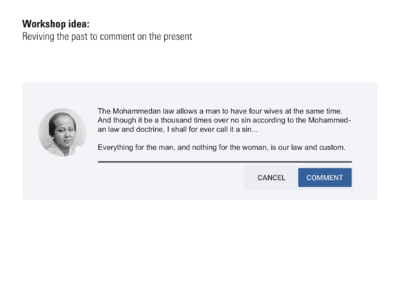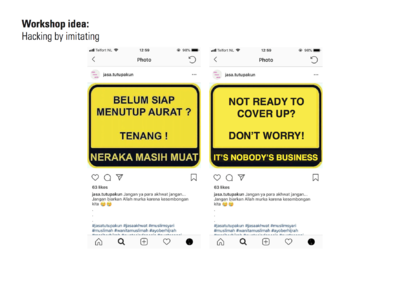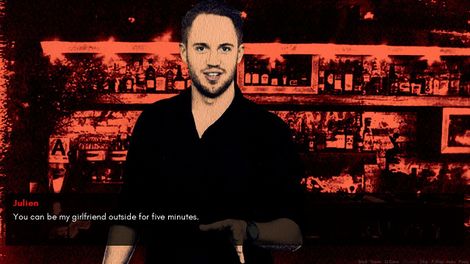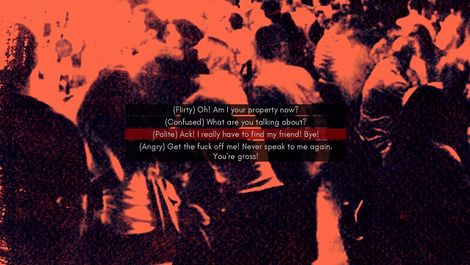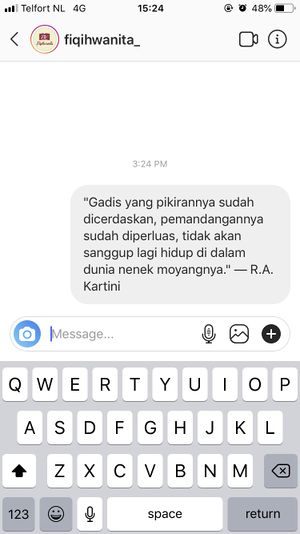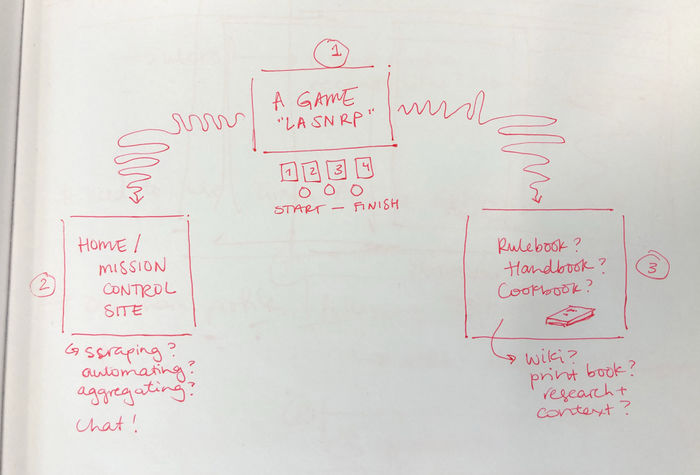User:Tash/grad prototyping2
Prototyping 14 Jan
Discussion with Andre:
- research on self censorship habits in Indonesia in last 5 years. Focus on informal silencing mechanisms
- urgency: different actors using social media to promote certain ideologies and suppress others, in an organized way
- large scale tactical media
- first idea: series of workshops where people could talk back to these problematics and learn how to resist them - can we suggest ways to view social media as a collective practice?
- problems: how to manage my role? as facilitator? educator? outsider? then – logistically, how to perform these workshops from NL?
- also, how to maximize the chance that the project goes beyond the workshops I host?
- Instead of workshops: developing an RPG, which presents several different strategies for performing and participating in social media environments that are especially hostile toward women.
- the game is multiplayer and has both online and offline aspects
- through roleplay, it invites you to engage in the manufactured arena of social media, but not as yourself – allowing you to experiment with a new relation to the medium
- the game and its outcomes (profiles created, comments left behind, accounts reported) are different every time it is played; consecutive games and gamers may interact with each other
- Plus point: "Games are distinct from work, which is usually carried out for remuneration, and from art, which is more often an expression of aesthetic or ideological elements."
- also: "Together, the players may collaborate on a story involving those characters; create, develop, and "explore" the setting; or vicariously experience an adventure outside the bounds of everyday life."
- Plus point: game development and gameplay can be collective, but the game is in itself also framework which can be used over and over without me
- think of: mechanisms that allow the collective to be aware of itself (hashtags? codes?)
- the 4 aspects of games: goals? rules? challenge? interaction?
- how can the game to be distributed? in a physical space? across virtual network?
References:
The Game: The Game by Angela Washko
The Game: The Game is a multi-choice videogame which takes the form of a dating simulator, pitting you against six men who are aggressively vying for your attention at a bar. Composed entirely of scenarios, techniques, and language from texts and instructional videos created by these seduction coaches, The Game: The Game flips the script on the iterative processes of some of the world’s most prominent pick-up artists. If their techniques are systematically manipulative, The Game: The Game allows you to tactically explore, expose, and defuse them.
Gabriella Coleman book
https://www.theguardian.com/books/2014/nov/19/hacker-hoaxer-whistleblower-spy-many-faces-anonymous-gabriella-coleman-review
https://gabriellacoleman.org/
ORES wikipedia editing workshop by Cristina and Manetta
https://pad.vvvvvvaria.org/trust%3Cin%3Eformation.workshop
Constant Dullart
The Possibility of an Army
https://motherboard.vice.com/en_us/article/bmvged/an-artist-is-creating-a-facebook-army-out-of-dead-soldiers-names
https://vimeo.com/145450925
Python Libs to track instagram:
https://instagram-engineering.com/web-service-efficiency-at-instagram-with-python-4976d078e366
https://github.com/facebookarchive/python-instagram
To do next:
- start with small scale, start developing the aims, premises of the game
- document the development of the game
- context: instagram
- central meeting space
- tracking mechanism:
- rules
- goals
- publishing mechanism
- my role: setting up the rules and then observe
16 Jan
Discussion with Aymeric:
- look at existing game cultures: e.g. ARG (alternate reality game (ARG) is an interactive networked narrative that uses the real world as a platform and employs transmedia storytelling to deliver a story that may be altered by players' ideas or actions)
- look at counterculture / revolutionary manuals, as a medium to accompany the game (a guide / rulebook to this practice you are developing)
- plus point: good to frame the project as a response to the already-existing game that social media has become. Therefore it is not the creation of a new game but an invitation to play it differently
- still unclear: the parameters of the game, how you would win / why
- important to explore the tension between 'real life' and the game
References:
Steal This Book by Abbie Hoffman
https://en.wikipedia.org/wiki/Steal_This_Book
The Anarchist Cookbook by William Powell
https://en.wikipedia.org/wiki/The_Anarchist_Cookbook
Assassin (live action game)
https://en.wikipedia.org/wiki/Assassin_(game)
Gameplay occurs at all hours and in all places unless otherwise disallowed by the rules. Since an elimination attempt could occur at any time, successful players are obliged to develop a degree of watchful paranoia.
World Without Oil (alternate reality game)
https://en.wikipedia.org/wiki/World_Without_Oil
World Without Oil (WWO) is an alternate reality game (ARG) created to call attention to, spark dialogue about, plan for and engineer solutions to a possible near-future global oil shortage, post peak oil. The game sketched out the overarching conditions of a realistic oil shock, then called upon players to imagine and document their lives under those conditions. Compelling player stories and ideas were incorporated into the official narrative, posted daily. Players could choose to post their stories as videos, images or blog entries, or to phone or email them to the WWO gamemasters. The game's central site linked to all the player material, and the game's characters documented their own lives, and commented on player stories, on a community blog and individual blogs, plus via IM, chat, Twitter and other media.
Research 23 Jan
Link to RPG 1: https://pad.xpub.nl/p/tash-documentation01
On game mechanics
Standard categories:
- Turns: In general, a turn is a segment of the game set aside for certain actions to happen before moving on to the next turn, where the sequence of events can largely repeat. In a truly abstract game (backgammon) turns are nothing more than a means to regulate play. In less abstract games (Risk), turns obviously denote the passage of time, but the amount of time is not clear, nor important. In simulation games, time is generally more concrete. Some games use player turns where one player gets to perform his actions before another player can perform any on his turn (Monopoly and chess would be classic examples). Some use game turns, where all players contribute to the actions of a single turn
- Action points: These control what players may do on their turns in the game by allocating each player a budget of "action points" each turn. These points may be spent on various actions according to the game rules, such as moving pieces, drawing cards, collecting money, etc.
- Cards: These involve the use of cards similar to playing cards to act as a randomizer and/or to act as tokens to keep track of states in the game. A common use is for a deck of cards to be shuffled and placed face down on or near the game playing area. When a random result is called for, a player draws a card and what is printed on the card determines the outcome of the result.
- Capture/eliminate: In some games, the number of tokens a player has on the playing surface is related to his current strength in the game. In such games, it can be an important goal to capture opponent's tokens, meaning to remove them from the playing surface. Many video games express the capture mechanism in the form of a kill count. Also think of: possibility of suspension / reinstatement.
- Catch-up: Some games include a mechanism designed to make progress towards victory more difficult the closer a player gets to it. The idea behind this is to allow trailing players a chance to catch up and potentially still win the game, rather than suffer an inevitable loss once they fall behind. Other games do the reverse, making the player in the lead more capable of winning, such as in Monopoly, and thus the game is drawn to an end sooner. This may be desirable in zero-sum games.
- Dice: These involve the use of dice, usually as randomisers. The most common use of dice is to randomly determine the outcome of an interaction in a game. Dice often determine the outcomes of in-game conflict between players, with different outcomes of the die/dice roll of different benefit (or adverse effect) to each player involved. This is useful in games that simulate direct conflicts of interest.
- Movement: Many board games involve the movement of playing tokens. How these tokens are allowed to move, and when, is governed by movement mechanics.
- Resource management: Many games involve the management of resources. Examples of game resources include tokens, money, land, natural resources, human resources and game points.
- Role-playing: Role-playing games often rely on mechanics that determine the effectiveness of in-game actions by how well the player acts out the role of a fictional character. While early role-playing games such as Dungeons & Dragons relied heavily on either group consensus or the judgement of a single player (deemed the Dungeon Master or Game Master) or on randomizers such as dice, later generations of narrativist games use more structured and integrated systems to allow role-playing to influence the creative input and output of the players, so both acting out roles and employing rules take part in shaping the gameplay.
- Game modes: A game mode is a distinct configuration that varies gameplay and affects how other game mechanics behave. A game with several modes will present different settings in each one, changing how a particular element of the game is played. One of the most common examples of game mode is the single player versus multiplayer choice in video games, where multiplayer can further be cooperative or competitive.
On victory mechanics
- Goals: This is the most general sort of victory condition, which can be broad enough to encompass any method of winning, but here refers to game-specific goals that are usually not duplicated in other games. An example is the checkmate of a king in chess.
- Quest: A quest in role-playing video games—including massively multiplayer online role-playing games (MMORPGs) and their predecessors, MUDs—is a task that a player-controlled character, "party" or group of characters may complete in order to gain a reward.
- Loss avoidance: Some games feature a losing condition, such as being checkmated (chess), running out of cards first (War), running out of hitpoints (Quake), or being tagged (tag). In such a game, the winner is the only remaining player to have avoided loss.
- Puzzle solving: Some games end when a player wins by solving a puzzle or riddle posed by the game. Examples include Cluedo, hangman and zendo.
- Races: Many simple games (and some complex ones) are effectively races. The first player to advance one or more tokens to or beyond a certain point on the board wins. Examples: backgammon, ludo, chutes & ladders.
- Structure building: The goal of a structure building game is to acquire and assemble a set of game resources into either a defined winning structure or into a structure that is somehow better than those of other players. In some games, the acquisition is of primary importance (e.g. concentration), while in others the resources are readily available and the interactions between them form more or less useful structures (e.g. poker).
- Territory control: A winner may be decided by which player controls the most "territory" on the playing surface, or a specific piece of territory. This is common in wargames but is also used in more abstract games such as go.
- Victory points: A player's progress is often measured by an abstract quantity of victory points or simply known as VP, which accumulate as the game develops.
Prototyping 11 Feb
Gameplay development Noting down all potential actions in the game: https://pad.xpub.nl/p/tash-documentation02
General rules
- always begin a game together
- always follow people back
- stay in character until further instruction
- always screenshot your engagements in order of play
- always end with a collective evaluation, adding to the rulebook / glossary online
Project plan
So far my idea is to have three parts to the project.
In order of priority, they are:
- the game (concept & material design)
- home / mission control website with documentation of gameplay
- the rulebook / reader (perhaps online)
Research: scraping / documentation mechanisms
Instagram API's

